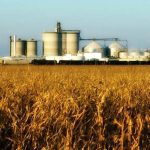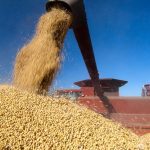Chicago soybean and corn futures surged on Friday after the U.S. Department of Agriculture projected lower-than-expected U.S. production after a dry end to the growing season.
Soybeans

U.S. grains: Corn and soybeans leap on smaller-than-expected US harvest

US issues partial guidance on clean fuel subsidies, chafing ethanol makers
U.S. biofuels groups are eager for clarity on the tax credits for fuels that combat climate change, which they hope will ultimately provide a pathway for corn-based ethanol to expand its market as a feedstock for sustainable aviation fuel.

Cuts to U.S. soybean, corn production
U.S. soybean, corn stocks mixed, more winter wheat planted
The United States Department of Agriculture cut its calls for 2024/25 U.S. soybean and corn production in its World Agricultural Supply and Demand Estimates (WASDE) released Jan. 10.

U.S. grains: Soybeans, corn rise as traders position ahead of USDA report
Chicago soybean and corn futures ticked up on Thursday as traders squared positions ahead of a major U.S. Department of Agriculture supply-and-demand report due on Friday.

China accelerates efforts to boost crop yields, ensure food security
China will accelerate the breeding of new soybean and corn varieties and prioritize yield improvements for key grains and oil crops, as part of broad efforts to ensure food security, the agriculture ministry said in a statement late on Wednesday.

U.S. livestock: Chicago grains, soy fall on dollar gains as traders await USDA data
Chicago corn, soy and wheat futures dipped on Wednesday as the dollar jumped on uncertainty over U.S. President-elect Donald Trump's tariff plans, and as investors squared positions and awaited supply and demand data from the U.S. Department of Agriculture.

ICE Weekly: No news means no canola price movement
A lack of significant news has prevented canola prices at the Intercontinental Exchange to break out of its recent trading range to start 2025.

CBOT weekly: Chicago soybeans/corn looking for direction
South American weather forecasts, positioning ahead of the Jan. 10 United States Department of Agriculture supply/demand report and uncertainty over trade policies under the incoming Trump administration were all influencing the Chicago grain and oilseed markets during the first days of 2025.

Dry spell puts southern Brazil soy farmers on alert as rains pound central regions
Dry weather is limiting soybean development in Brazil's southernmost state, putting farmers on alert there at the same time as excessive rain is set to disrupt early harvest work in central areas of the country, according to meteorologists.

U.S. grains: Chicago soybeans dip on rainy Argentina forecast
Chicago soybeans ticked lower on Tuesday as expectations for rain relief in Argentina encouraged profit-taking, after drier forecasts and a softer dollar fueled gains during the previous session.



